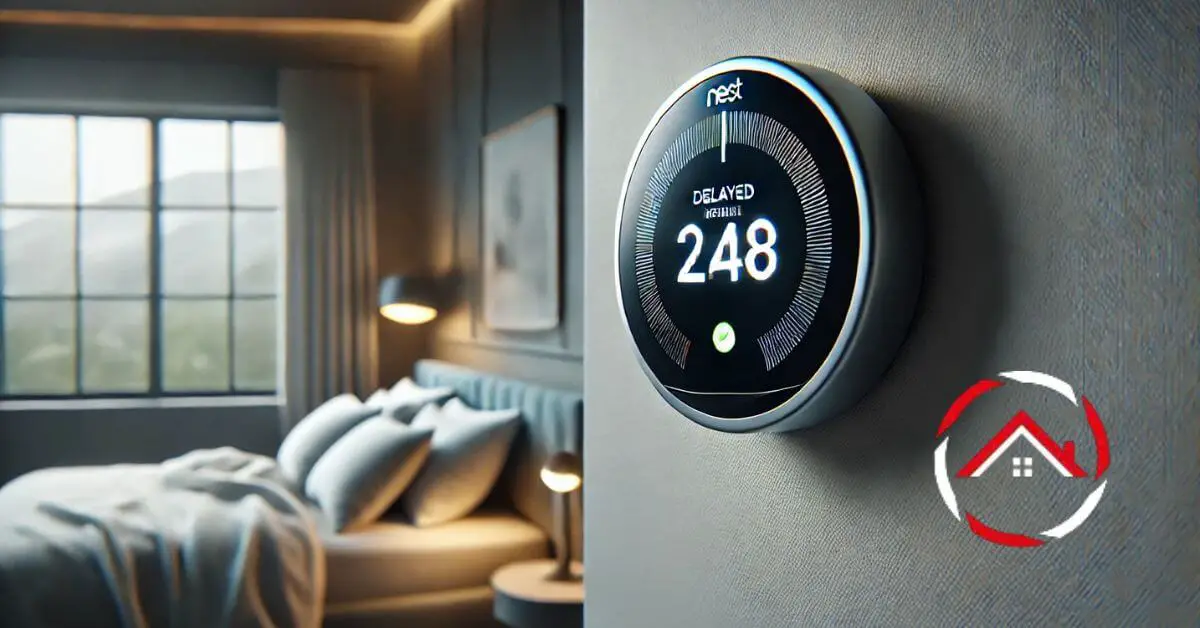Have you ever been frustrated by your Nest Thermostat taking longer than expected to adjust your home’s temperature? It’s a common issue that many users face. Delays in your thermostat’s response time can leave you wondering what’s going wrong.
In this article, we’ll uncover the reasons behind these delays and share simple solutions to get your Nest Thermostat working at its best again, including why does Nest Thermostat say delayed.
Whether it’s a minor setting issue or something more, we’ve got you covered with easy fixes and when it’s time to call for help.
Let’s get your home comfortable again, without the wait!
Table of Contents
What is the Nest Thermostat?
The Nest Thermostat is a smart device that adjusts your home’s temperature for comfort and energy efficiency. With its intuitive design and advanced features, it helps you save on energy bills while keeping your home cozy. Here’s what you need to know about it.
5 Features of the Nest Thermostat
- Smart Learning: It learns your preferences over time and adjusts your home’s temperature automatically.
- Energy Savings: It helps reduce energy consumption by optimizing heating and cooling schedules.
- Remote Control: You can control it from anywhere using the Nest app on your phone.
- Voice Control: Works with voice assistants like Google Assistant and Alexa for hands-free adjustments.
- Easy Installation: The Nest Thermostat is simple to set up, and many users can do it themselves.
What is Nest Thermostat Delayed?
The Nest Thermostat is designed to adjust your home’s temperature automatically, but sometimes it doesn’t respond as quickly as expected.
Understanding the causes behind these delays will help you fix the issue and improve your thermostat’s performance.
Delayed Start
A delayed start occurs when your Nest Thermostat takes longer than it should to adjust the temperature after you’ve set it. You may notice that it doesn’t kick in immediately, leaving your home colder or warmer than you want it.
- Temperature Swing Settings: If the swing is set too high, the thermostat might not activate quickly enough.
- Connectivity Issues: A weak Wi-Fi connection can delay signals sent to your thermostat.
This delay can lead to discomfort and even energy inefficiency as the thermostat struggles to catch up.
Delayed Stop
A delayed stop happens when your Nest Thermostat fails to turn off heating or cooling at the set time. This means your system continues running longer than necessary, which wastes energy and increases your bill.
- Temperature Fluctuations: If the thermostat is in an area with constant temperature changes, it may delay stopping.
- System Confusion: The thermostat may misinterpret room temperature, thinking it still needs heating or cooling.
This can be particularly annoying, as it not only affects your comfort but also increases your utility costs.
5 Top Causes Why Does Nest Thermostat Say Delayed
If your Nest Thermostat isn’t working as it should, there are several possible reasons. Let’s look at the common culprits.
1. Temperature Swing Settings
Your thermostat has a setting that controls how much the temperature can vary before it makes adjustments. If this “swing” is set too wide, it can cause delays.
Here are a few causes:
- Wider Temperature Swing: When you allow the temperature to fluctuate too much, the thermostat will take longer to react and adjust.
This can leave your home at a less comfortable temperature for longer periods.
2. Wireless Connectivity Issues
Nest needs a stable Wi-Fi connection to work efficiently. If your Wi-Fi signal is weak or there’s interference, your thermostat might not respond as quickly as it should.
Here are a few causes:
- Weak Signal: If your router is too far away or there’s interference, the thermostat might struggle to receive commands.
- Router Issues: Sometimes the router itself may be causing delays, requiring a reset or adjustment.
A slow or disrupted connection can delay any adjustments you make through your Nest app or thermostat.
3. Software or Firmware Issues
Just like any other smart device, your Nest Thermostat needs regular software updates to function properly. Without these updates, bugs can slow down its performance.
Here are a few causes:
- Outdated Firmware: If your thermostat isn’t running the latest firmware, it may cause erratic behavior.
- Missed Updates: Regular updates are necessary to keep everything running smoothly and avoid delays.
Keeping your thermostat updated ensures it functions at its peak performance.
Power Supply Problems
If your Nest Thermostat is having power issues, it can cause delays in its operations. A lack of power or unstable voltage can affect its performance.
Here are a few causes:
- Low Battery: If the thermostat’s battery is low or not charging properly, it might not perform as expected.
- Wiring Issues: Faulty wiring or loose connections can also impact its functionality.
A consistent power supply is necessary for smooth operation.
Poor Location of the Thermostat
Sometimes, where you place your Nest can affect how it reads the temperature. Poor placement can cause the thermostat to take longer to adjust the temperature.
Here are a few causes:
- Direct Sunlight: If your thermostat is in direct sunlight, it might misread the room’s temperature.
- Near Heat Sources: Placing the thermostat near heat sources like radiators or electronics can also cause delays.
Consider moving the thermostat to a more neutral location for accurate readings and faster responses.
5 Effective and Easy Ways to Fix Nest Thermostat Says Delayed
Struggling with a delayed Nest Thermostat? Don’t worry! Here are five simple fixes you can try at home to get things back on track quickly.
Adjust Temperature Swing Settings
Sometimes, the delay happens because the temperature swing is too wide. Narrowing it can improve the response time.
Steps:
- Set a tighter temperature swing: This reduces the range within which the thermostat waits before adjusting the temperature.
Result: You’ll see faster responses and less delay.
Check Wireless Connectivity
Your thermostat needs a strong, stable connection to your Wi-Fi network. Poor connectivity can cause delays.
Steps:
- Check Wi-Fi signal strength: Make sure the thermostat is within range of your router.
- Reboot your router: This can refresh your connection and improve performance.
A stable connection will speed up your thermostat’s response time.
Update the Software
Outdated software is a common culprit of slow performance. Keeping your thermostat up-to-date ensures it runs efficiently.
Steps:
- Check for updates: Make sure the thermostat is running the latest version.
- Enable automatic updates: Keep the system current with automatic updates.
Regular updates help the thermostat function at its best.
Reset the Thermostat
If Nest thermostat says delayed persistently, a reset might be the easiest fix. This can restore your thermostat to its factory settings and resolve glitches.
Steps:
- Factory reset: Go to settings and reset your thermostat.
Result: It will reboot and can resolve ongoing issues, including delays.
Reposition the Thermostat
Where you place your thermostat matters. Being too close to heat sources or drafts can affect its accuracy.
Steps:
- Move the thermostat: Ensure it’s in a neutral spot, away from direct sunlight or heat.
- Ideal placement: Keep it in the center of your home, away from any strong temperature sources.
Proper placement ensures your thermostat performs accurately and responds faster.
3 Potential Scenarios When Should You Contact Support?
Sometimes, despite your best efforts, the issue may still persist. Here are three situations when reaching out to Nest support is the best option.
Persistent Connectivity Issues
If your Nest Thermostat continues having trouble connecting to Wi-Fi, even after you’ve tried troubleshooting, it’s time to contact support. There may be deeper issues with your network or settings that you can’t resolve on your own.
Here are a few causes:
- Weak Signal: Your Wi-Fi signal might be too weak for stable communication.
- Network Issues: There could be more complex network settings affecting the connection.
Support can help identify the issue and guide you through a solution.
Unresolved Software Problems
Software glitches can be hard to fix on your own. If software updates and resets don’t solve the problem, it’s best to contact Nest support for assistance.
Here are a few causes:
- Outdated or Corrupt Software: If updates aren’t working, the system might be corrupted or need a more advanced fix.
- App or Firmware Issues: Sometimes, the problem may lie within the app or firmware itself.
Support can provide a tailored solution to get your thermostat running smoothly again.
Hardware Failures
If you’ve tried all the steps and the thermostat still isn’t working, the issue might be physical. If the device seems damaged or malfunctioning, it’s time to contact support.
Here are a few causes:
- Faulty Components: There may be a problem with the internal hardware.
- Physical Damage: Any damage to the unit could lead to malfunctions.
Support can assess whether your thermostat needs a replacement or repair.
Final Thoughts on Nest Thermostat Delayed
Dealing with Nest Thermostat delays can be frustrating, but most of the time, the causes are easy to fix.
By understanding the main reasons behind these delays, you can troubleshoot quickly and keep your home’s temperature right where you want it.
Whether it’s adjusting settings or checking your connection, there are simple solutions to get your thermostat back to optimal performance.
Explore our other blog posts for more tips and solutions to keep your smart home running smoothly!
Frequently Asked Questions
Why does my Nest thermostat say delayed when heating?
Your Nest thermostat may show “delayed” when it needs a moment to activate heating. This usually happens due to power-saving mode, low battery, or minor Wi-Fi disruptions. Ensure your thermostat’s C-wire is connected for consistent power to prevent delays.
How long does the delay on a Nest thermostat last?
A delay on a Nest thermostat typically lasts a few minutes, allowing it to regulate power or reconnect to the system. However, if it persists, check power sources and Wi-Fi connection, as extended delays might indicate low power or connectivity issues.
How can I stop my Nest thermostat from saying delayed?
To prevent delays, ensure a steady power supply and strong Wi-Fi signal. Connecting a C-wire for continuous power can help avoid delays. Regularly check for low battery issues, as consistent power is essential for your thermostat to work without interruptions.
Does a Nest thermostat delay indicate a malfunction?
Not necessarily. The “delayed” message is common when Nest manages power or connectivity issues. It helps avoid short cycling, prolonging system life. If the delay persists, however, it could signal a power or connectivity issue that may need troubleshooting.
Reference:
Google Nest Community. Thermostat delay message


